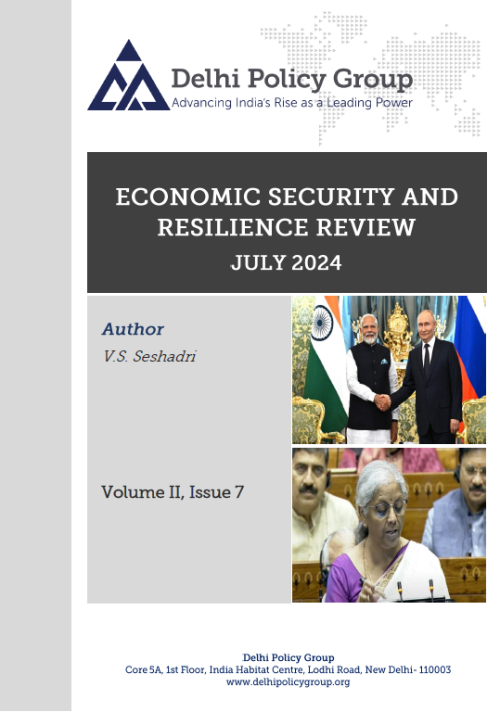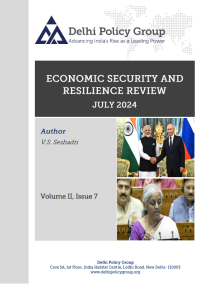Economic Security and Resilience Review
Date: August 04, 2024
This issue of ESRR looks at the Union Budget proposals for FY 2024-25. The launch of a critical minerals mission can particularly help strengthen India’s economic security. Furthermore, reviews announced on investment rules and customs rates aimed at simplification and rationalisation could also help spur exports and attract enhanced foreign investments into the country.
The Economic Survey for 2023-24 has in one of its chapters addressed the economic challenges facing India over the medium term, including the policy options for dealing with the China challenge. While the survey has made some suggestions, including the option of easing FDI from China, Commerce and Industry Minister Piyush Goyal has subsequently clarified that there was no reassessment in the government to support Chinese investments into the country.
PM Modi’s visit to the Russian Federation from July 8-9, 2024 resulted in a further consolidation of economic ties. President Putin and PM Modi signed a joint statement outlining the development of nine key strategic areas for bilateral economic cooperation up to the year 2030. Apart from increasing annual bilateral trade from the present US$ 65 bn to around US$ 100 bn by 2030, the roadmap drawn included the development of a bilateral settlement system using local currencies, diversification of trade corridors, and expanding cooperation in energy, infrastructure and the supply of fertilisers.
British Foreign Secretary David Lammy, from the new Labour Party-led government, visited India on July 24 at the invitation of EAM Dr. S. Jaishankar. Both sides appreciated the substantial progress made in the India-UK FTA negotiations and looked forward to its early conclusion. The two sides also launched a Technology Security Initiative that will be jointly coordinated by the two national security advisers.
This issue of the ESSR covers in some detail the outcome of the Third Plenum of the 20th Party Congress of China’s Communist Party. There is every indication from its outcome that China will continue to employ industrial policies to further strengthen its production and trade dominance, particularly in strategic sectors.
Italian PM Giorgia Meloni’s five day visit to China from July 27, that resulted in the signing of a three-year Action Plan with PM Li Qiang, was seen as an attempt to re-set bilateral trade and economic relations after Italy’s exit from the BRI last December, and lower the pressure of retaliatory moves by Beijing against some of the trade actions against taken by the EU against China.
Other developments covered in this issue of ESRR include Germany’s recent bans against China in the technology sector; China’s launch of a retaliatory probe on recent trade defence actions by the EU on certain Chinese products; and Indonesia’s proposed move to impose safeguards/anti-dumping duties on products in seven sectors.
These and certain other developments covered in this month’s ESRR can be viewed at ESRR, Vol. II, Issue 7.
To read this ESRR, Vol. II, Issue 7, please see the PDF attached.
The Economic Survey for 2023-24 has in one of its chapters addressed the economic challenges facing India over the medium term, including the policy options for dealing with the China challenge. While the survey has made some suggestions, including the option of easing FDI from China, Commerce and Industry Minister Piyush Goyal has subsequently clarified that there was no reassessment in the government to support Chinese investments into the country.
PM Modi’s visit to the Russian Federation from July 8-9, 2024 resulted in a further consolidation of economic ties. President Putin and PM Modi signed a joint statement outlining the development of nine key strategic areas for bilateral economic cooperation up to the year 2030. Apart from increasing annual bilateral trade from the present US$ 65 bn to around US$ 100 bn by 2030, the roadmap drawn included the development of a bilateral settlement system using local currencies, diversification of trade corridors, and expanding cooperation in energy, infrastructure and the supply of fertilisers.
British Foreign Secretary David Lammy, from the new Labour Party-led government, visited India on July 24 at the invitation of EAM Dr. S. Jaishankar. Both sides appreciated the substantial progress made in the India-UK FTA negotiations and looked forward to its early conclusion. The two sides also launched a Technology Security Initiative that will be jointly coordinated by the two national security advisers.
This issue of the ESSR covers in some detail the outcome of the Third Plenum of the 20th Party Congress of China’s Communist Party. There is every indication from its outcome that China will continue to employ industrial policies to further strengthen its production and trade dominance, particularly in strategic sectors.
Italian PM Giorgia Meloni’s five day visit to China from July 27, that resulted in the signing of a three-year Action Plan with PM Li Qiang, was seen as an attempt to re-set bilateral trade and economic relations after Italy’s exit from the BRI last December, and lower the pressure of retaliatory moves by Beijing against some of the trade actions against taken by the EU against China.
Other developments covered in this issue of ESRR include Germany’s recent bans against China in the technology sector; China’s launch of a retaliatory probe on recent trade defence actions by the EU on certain Chinese products; and Indonesia’s proposed move to impose safeguards/anti-dumping duties on products in seven sectors.
These and certain other developments covered in this month’s ESRR can be viewed at ESRR, Vol. II, Issue 7.
To read this ESRR, Vol. II, Issue 7, please see the PDF attached.



